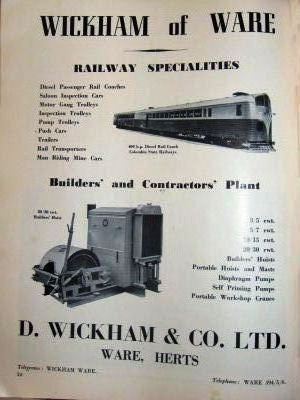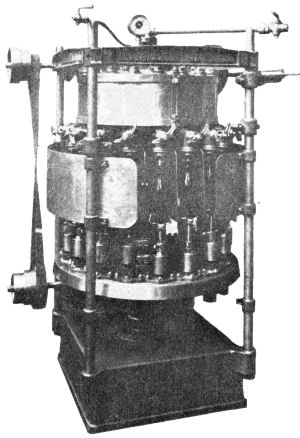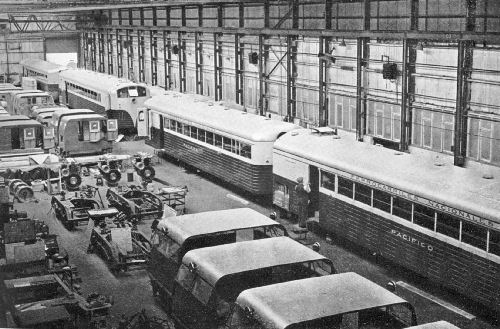|
|
Finding out about your ancestor's employer - a case study WICKHAM, Ware, late 19th & 20th Century October, 2009 |
|
For people researching their family history it can often be very rewarding to ask about the work they did, which means finding out about local employers and I decided to find out what information can often be found out about a large local company with the kind of resources you might find in a Hertfordshire local studies library if you live in, or are visiting the area. Information for the whole county will normally also be found at HALS and well as the local library, and some
Below I bring together what I found about Wickham of Ware from a number of sources:
Trade Directories: For this purpose I used the CD produced by Archive CD Books of County trade directories - but many of the larger towns local studies libraries will hold local street directories which can be even more informative.
Local History and other books about the area: In this case I found four pictures (two reproduced here) relating to Wickham's activities in The Book of Ware. Some of the larger towns may have a dozen different local books of pictures and history on their library shelves (possibly reference copies - not for loan) - and you may well find booklets or articles produced by a local history society or museum. Any of these could include information on the larger local companies.
Town and County Guides: Many of the larger towns have produced guides to attract people and companies to come and live or work in the town and these will often include adverts and descriptions of local industry. The Hertfordshire Review falls into this category.
Specialist industry books: In this case study I found relevant information in the book Brewers in Hertfordshire and I am sure I could have found some railway books mentioning the company if I had spent more time looking. Examples of other specialist books relating to Hertfordshire are Industrial Archaeology of Hertfordshire, Hertfordshire Windmills and Windmillers, and Cinemas of Hertfordshire.
Books on the Company: If you are very lucky (as in this case) there might be a book on the company and its history. Some examples are The Endless Web: John Dickinson & Co Ltd (paper making), Stephen Austin of Hertford (publishing) and Addis, 1780-1980 (brushmaking). For long established companies there may also be booklets, produced to celebrate an anniversary, with limited circulation, and local studies libraries can be a good place to start looking.
Other sources. Local newspapers can be a useful source - and some companies might have had regular advertisements - but searching unindexed newspapers can be very time consuming and needs preparation. Maps may show how factories have grown by time, and there could be additional information, such as photographs, in a local studies library.
The following shows what I could find on Wickham of Ware within arm's reach in my own library in a few hours, involving published paper records (and the trade directories CD). I could also have found out genealogical information on members of the family from the census and other online records - but the purpose of this case study is to demonstrate the use of paper records.
| 1882 | WICKHAM WILLIAM, brewer; the Ware pale ale & light bitter supplied to families in casks & put into cellars, per contract; the absolute purity of the above articles as delivered from the stores guaranteed; discount for cash, High Street. See advertisement. |
|
||
| 1890 |
WICKHAM DENNIS, manufacturer of patent machinery for carbonating & bottling beer & other frothing liquids, Star Brewery, High Street |
|||
|
Wickham Edward Carrington, builder & contractor, Baldock Street |
||||
|
Wickham William, brewer; the Ware Pale Ale & Ware Brown Stout & Light Bitter Beer supplied to families in casks & put into cellars, per contract; also bottled ale and stout; the absolute purity of the above articles as delivered from the stores guaranteed, and mineral water manufacturer; discount for cash, Star Brewery office, High Street. |
||||
| 1912 |
Wickham D. & Co. brewery & general engineers, Viaduct Road |
|||
| 1926 |
Wickham D, & Co. Ltd. brewers' engineers, Viaduct Road, T.N. 94 |
|||
| 1929 |
Wickham D, & Co. Ltd. rail-car engineers, Viaduct Road, T.N. 94 |
 |
| D. Wickham & Co - from The Book of Ware |
|
The Star Brewery, Ware The Star Brewery on Watton Road, was initially owned by members of the Hitch family, who were already well established in Ware as maltsters. It was a three storey tower brewery with fermenting and tun rooms, malt and cask stores. Caleb Hitch was there from 1862 to 1866 and leased the brewery to Isaac Everitt from 1866 to 1874 and later to McMullen's of Hertford from 1874 to 1878. It was then owned by William Wickham from 1879 to 1899 and leased to Holt & Co. Marine Brewery, East Ham, London E7 (1900-12) and leased once more to McMullen's during 1914. Subsequently they bought it by 1931 but had sold it again by 1938 to Herbert Lynn who in turn sold it to Ware Brewing Company from 1938 to 1951 and finally sold to Wells & Winch of Biggleswade during 1952. Brewing had ceased by 1952. The buildings have now been sensitively restored. Caleb Hitch does not appear to have had a known tied estate when he owned the Star Brewery between 1862 and 1866. However, this was at a time when no Petty Sessions licensing records exist. When he was no longer an active brewer he bought the Rose and Crown and the Victoria in Ware from William Wickham c.1889 and leased them both later to Holt's Marine Brewery. These new owners bought and leased a number of other local properties (Table 28.2). |
|
A Romance
in Engineering from The Hertfordshire Review |
||
|
TOWARDS the close of the 18th century, Dennis Wickham, owner of a Hertfordshire Brewery, needed machinery to make clear, sparkling beer. At this time no such machinery existed, so he set about manufacturing it himself in a small engineering works at Ware. To-day, these same works are taking a major part in assisting Britain's economic recovery though the country's export drive. Dennis Wickham died in 1910, and for fourteen years after his death the factory carried on the manufacture of brewing machinery and bottling plant until stagnation set in and the founder's widow sold out to the present owners. The new proprietors were not interested in the plant from the point of view of servicing the brewing industry; they knew nothing about beer except perhaps its taste, but their knowledge of motor cars and railway tracks was sound and comprehensive, and it says much for their ingenuity and perseverance that within a short space of time they were able to turn out, in a modest way, cars for railtrack inspection and maintenance which made the name "Wickhams of Ware" known throughout five continents. In the same way that Dennis Wickham was a pioneer in the manufacture of special plant for brewing, so were the present owners in so far as the design of railcars was concerned. For instance, they introduced roller-bearing axle-boxes, welded steel frames, underslung springs, and all-steel bodies. Then came the building of passenger railcars, the bodies of which had formerly been made of wood or light steel, but Wickhams used square solid drawn steel tube for this purpose. For fifteen years they kept pegging away, and in that period increased their resources tenfold. |
When the second world war came, they were in a position to make a healthy contribution towards its prosecution. During the six years which the war lasted, this works, situated two miles from the county town, was engaged in overhauling tanks and in the manufacture and design of weapons of war and their component parts. The best brains in the place were employed in getting out designs for this machinery. Many artillerymen will remember the motor railtrolley, carrying a target automatically accelerated or braked by ramps between the rails, which afforded the guns moving battle targets. Included among their other efforts were the cable-layers which ejected wire like water from a hose, used for balloon and transport winches, wrecking and workshop cranes. War changed the pattern of the works almost beyond recognition. The motor railcoach shops were given over to tank and engine overhauls, and the machine shop to the production of gun mountings and aircraft components. The foundry tackled and mastered the most complicated manganese bronze castings. The war ended, and once again Wickhams were forced to change their production methods to cope with the requirements of a post-war world. The transformation took some time, but during the process they were endeavouring to keep output on a par with orders.
To-day, 90 per cent of their output is exported, most of it to South America, some to Africa, Ceylon, Egypt, and British Columbia. One of their latest products is the Plantation Car, and this is used largely in Portuguese East Africa. |
|
|
|
||
|
"For Export Only" Trains for South America made by D. Wickham Co. Ltd. |
||
 |
||
|
Book:
“Wickham
of Ware - the history of D. Wickham & Co. Ltd, Railcar Manufacturers"
by James Cooper Jnr and Loxley Ford, edited by David Perman and
published by Rockingham Press in December 2003 (ISBN 978-1-873468-40-1).
- Wickhams were one of the largest employers in Ware at one time and
established a worldwide reputation for themselves as suppliers to the
railway industry. They also built rolling stock for the British Railways
Board and had a special arrangement with them to use the St Margarets to
Buntingford branch line to test completed trains before delivery.
[Book recommended by Rob Candlish.] [link] [I did not have a copy of this book available when I prepared this page.] |
||



